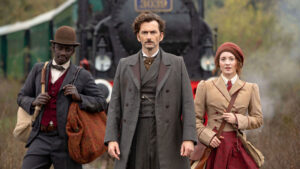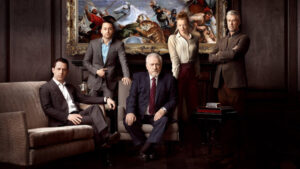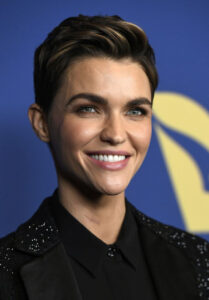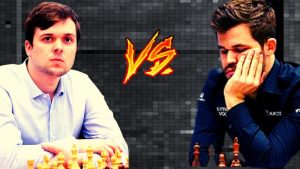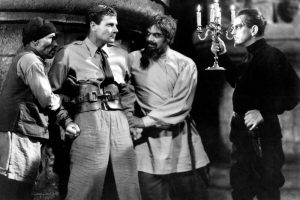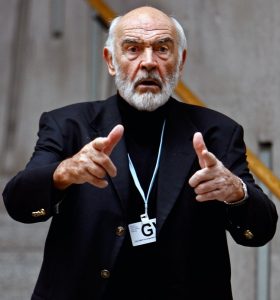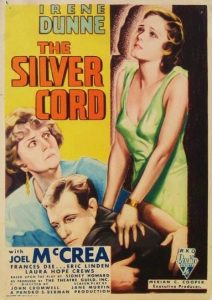I watched the second episode of Around the World in 80 Days and enjoyed it more than the first. This, if you’ve read my first review, is damning with faint praise. Still, I thought this episode showed an understanding of the Hero’s Journey and the structure of a good story even if it didn’t generally succeed.
In this episode our band traverses Italy by train heading toward, well, that is a bit of mystery to me as the geography didn’t make much sense. I’ll get to that later.
The Strangers
We start the episode on a train with a group of Italians led by an industrialist giving a speech and being interrupted by his son who spots our heroes in a balloon. Soon enough the balloon crashes and Fogg, Fix, and Passepartout climb aboard the train where class restrictions send the Frenchman into the rear with the unwashed masses while our heroes enjoy the luxury of privilege.
I was a bit confused about where our heroes got their evening wear but I shall not nitpick too much, it’s not important.
The idea of the main characters encountering strangers and interacting with them is obviously going to be a major theme of Around the World in 80 Days. This requires a deft touch because we only meet people for a short time. I expounded on the problems with this in my review of the first episode in Paris.
This time the situation is handled with greater aplomb. We actually get to meet the father and son while seeing their conflicts first hand. We see the son’s wonder at new inventions and the father’s staid demeanor. This helps later when the two become focal points in the story.
Personal Conflict in Around the World in 80 Days
Conflict makes a story and we have it aboard the train in two ways. First, Fogg is berated by the Italian father for not being much of an adventurer. It’s a good conflict in that it exposes Fogg’s weaknesses but I’m just not sure from whence it came. Why such vitriol? Still, this is actual character development and a good thing. We learn Fogg is insecure about his life and rather timid in nature. Episode one might have spent time developing all of this but at least we’re getting it now.
Meanwhile Passepartout is getting drunk and losing at cards in back. He is upset by his brother’s death, understandable although it came and went so fast, I’m having trouble finding empathy for the Frenchman. Then Abigail Fix arrives on the scene.
Fix begins blathering on and on about how she is independent and doesn’t need a man. This annoys the card players as they simply want to play. It’s an interesting scene but I am confused. Is Fix actually this socially oblivious? If so, why didn’t we see it earlier? In her first scene she seemed to be interacting with the rough and tumble newspaper men with ease and style.
Perhaps Fix is a card sharp who recognized Passepartout’s inept playing and contrived her social ineptitude as a way to limit the Frenchman’s losses without embarrassing him. This is an interesting story idea but, necessarily, we need to know Fix is good at cards. Again, the failures of the first episode of Around the World in 80 Days is haunting us here in the second.
The Bridge is Out!
Conflict is necessary. Sure, the bridge being out is contrived but that’s fine. We writers need to do things like that. Yes, the son’s gaping wound is overkill but I can live with it and it’s necessary for the boy to eventually inspire the despondent Fogg. More on that in a moment.
The reluctant protagonist finding out he has the resources necessary to overcome obstacles shows a firm understanding of the Hero’s Journey. Fogg figures out the load of the train and the support of the remaining track and guides our team, with no small help from Fix and Passepartout, to success.
My problem with this scene is that we didn’t know Fogg was an engineer by trade or at least has significant education in that regard. Maybe it was mentioned in passing at the Reform Club but not with enough emphasis to make me notice. This is the sort of development we needed in the first episode of Around the World in 80 Days.
Nitpicking
I know I said I wasn’t going to nitpick, but I would have simply emptied out the carriage of seats and other heavy items. Then there’s enough coal for the journey. It makes no sense.
In addition, they mention it is six hours back to Rome and two hours to their destination. Rome is basically near the center of Italy and I’m guessing they are heading south to catch a ship across the Mediterranean to Cairo. This indicates a journey to Taranto which is 268 miles from Rome. Now, I’m no engineer but the time scale seems way off to me.
The bankruptcy of Fogg’s fellow Reform Club member and need to create further obstacles is sprung on us too quickly and, frankly, I find it unnecessary. There should be plenty of conflict on the journey without the mysterious villain. Why weren’t the financial troubles mentioned earlier if they are so important? Again, missed opportunities in the first episode.
Fogg the Hero
Eventually they arrive at their destination and Fogg is still despondent for some reason. Fogg just saved the boy’s life; he solved a major obstacle. Why isn’t Fogg elated, ready to take on any adventure? In any case, a quick word from the wounded lad and he’s ready to go again. The writers have the right idea of Fogg needing inspiration, I just thought a lighter touch necessary.
Conclusion
I enjoyed this episode far more than the first. It shows an understanding of story structure, character arc, the Hero’s Journey, conflict, and other elements required for engrossing entertainment. Having said that, it all seemed heavy handed at best.
It gives me hope.
